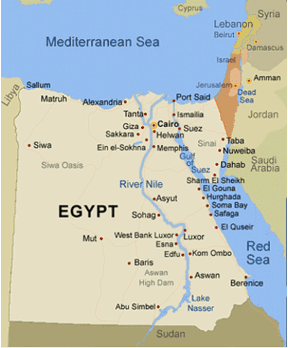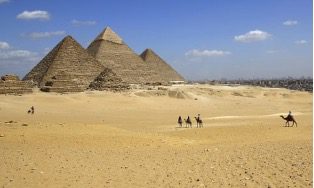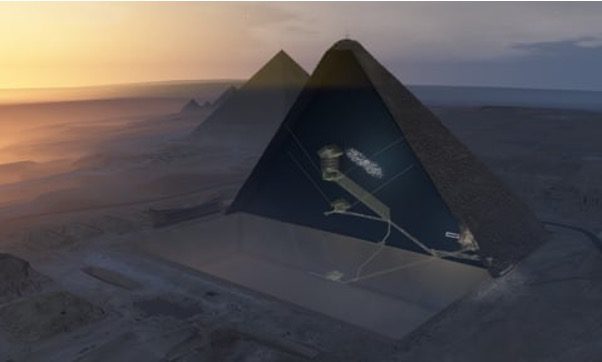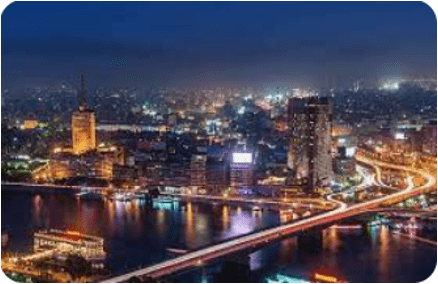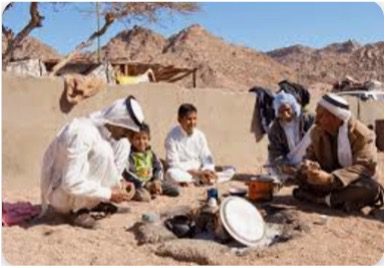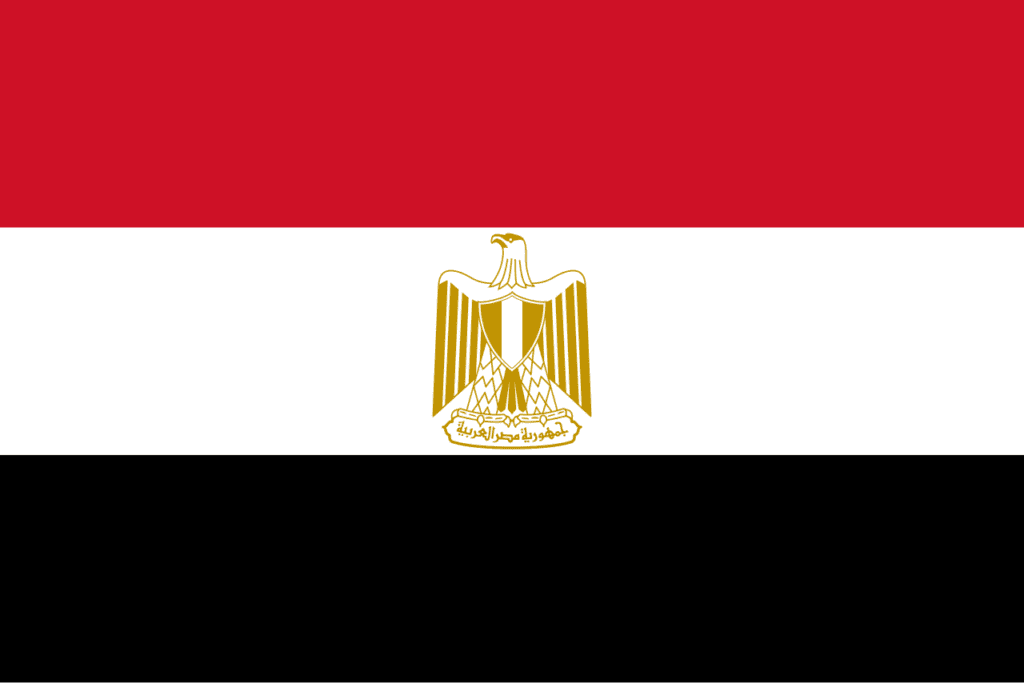
Egypt
After the flood, descendants of Noah’s three sons, Japheth, Ham, Shem, who possessed advanced technology approximately 4,000 y ago, moved together to the plains of Shinar and, rebelliously, build the Tower of Babylon. Ham had three sons: Canaan, Cush and Mizraim. After God confused their language, groups spread all over the world. Each group leaving Babel took with it whatever skills its members possessed. Mizraim (Strong 4714 מִצְרַיִםMitsrayim=Mitsrajim, i.e. Upper and Lower Egypt). Noah’s grandson, was the founder of Egypt around 2188 BC., a date consistent with both biblical and secular records. And from him the first Egyptian Dynasty sprung. The Egyptians, the Sumerians, and the Mayans all retained the technology to build pyramids. Imhotep designed Egypt’s first pyramid for third dynasty pharaoh Zoser.
The Great Pyramid of Giza, built for Pharaoh Khufu of the fourth dynasty, is “the largest and most accurately constructed building in the world.” This pyramid required advanced optical, surveying, mathematical, and construction techniques, an impressive leap beyond the technology demonstrated in earlier pyramids.
Abram’s visit to Egypt may explain Egypt’s sudden advance. Abram grew up in the advanced but idolatrous culture of Ur about three centuries after the Flood. Josephus wrote that Abram “communicated to them arithmetic, and delivered to them the science of astronomy; for before Abram came into Egypt they were unacquainted with those parts of learning; for that science came from the Chaldeans into Egypt.” Based on Josephus’s statement, Abram’s visit to Egypt may well have occurred during the fourth dynasty.
In Egypt, most persecution happens at the community level. Men can experience job loss or lack of employment opportunities, women can be harassed in the street, Christian children can be bullied at school, and, in rare instances, mobs of Muslim extremists force Christians to flee their communities. These incidents are most common in the Upper Egypt region, where Islamic hardliners are active, especially in rural communities.
President al-Sisi and his government regularly speak positively about Egypt’s Christian community—which, through the Orthodox Church, is long and historic. He purposely includes both Muslims and Christians in Egypt’s identity. However, this stance does not always extend to areas outside of major urban centres—authorities are known to ignore the concerns of Egyptian believers. Christians also have difficulty getting permission to build church buildings. Due to al-Sisi’s authoritarian style of government, speaking out against injustice can be dangerous.
Christians who have converted from Islam face enormous pressure from their family and community to return to Islam. Egyptian security services are known to detain and intimidate converts to keep quiet about their conversion. The state also makes it impossible for converts to officially be recognised as Christians.
PRAYERS FOR Egypt
- Pray that Egyptian Christians who follow Jesus out of Islam will be kept safe.
- Ask God to help Christians who have converted from Islam find fellowship and are discipled.
- Pray for Christians’ legal rights, that they will not be discriminated against.
- Pray for saved expatriates to return to their homeland to bring them the Gospel
- Pray that the real Gospel is witnessed to members of non-evangelical churches.
More Prayers
- A decade has passed since the upheaval of the Arab Spring. Some of the change protestors hoped for has arrived, but much remains the same as before 2011. President Sisi appears to be instilling authoritarian rule once again, but many – including Christians – feel this is necessary to curb Islamist movements from regaining control. Christians still live in a precarious situation regarding religious freedom and persecution. Many Muslims would prefer Egypt did not have such a large Christian population. Pray for a government that serves God’s purposes – to restrain evil, punish crime, and enable peaceful and quiet lives among the citizenry.
- The government is even more authoritarian than pre-Arab Spring, yet it faces many problems. Radical Islamist groups pop up and commit terrorist actions, the economic and employment situation in Egypt is reaching crisis mode, and Egypt must deal with multiple problematic neighbours in Libya, Israel and the Gaza Strip, and Sudan. Water issues are becoming very serious and, combined with population growth, intensify both poverty and unemployment. Pray that corruption would be rooted out, justice done and fair laws passed and then carried out in the interests of the people.
- The Coptic Church is by far the largest body of Christians in the Middle East and is a strategic key for the evangelization of the region. Pray for:
- Church leaders, especially the Coptic Pope. Wisdom, grace and confidence are needed in handling the Muslim authorities, Islamist persecution and the questioning world. A close walk with God is essential to be both a bridge between communities and an example to their flock.
- A spiritual awakening Church-wide in the midst of mounting pressures and communal tensions. Many Copts are very nominal. The responses to Muslim agitation need to be humble and loving but strong, and only those walking in faith are capable of this.
- The biblically based renewal movement in the Coptic Church, which has steadily gained momentum since 1930. It strongly emphasizes Bible study and personal faith, and many are fervent witnesses for the Lord. Monasticism sees a rejuvenation as well. Pray for the growth and effectiveness of this movement of the Spirit.
- Christians are numerous in business, the professions and health services, but overall the Coptic influence within Egypt is much less than their large numbers warrant. Praythat Copts might have a positive and transforming effect in the nation, just as Joseph did millennia ago.
- The Protestant churches sprang out of the Orthodox Church, but did not significantly grow for a long while. However, since 1973, a renewal movement and a new generation of bold leaders are spurring growth. Young people are numerous and active in these churches, and several Pentecostal and evangelical denominations see notable increases. Many churches have extensive social and medical programmes to help the very poor and the disabled.
- Persecution of Christians has steadily intensified in the last 20 years. Harassment, discrimination on individual and communal levels and financial incentives for Christians to adopt Islam are all used to break the morale of Christians. Some areas, such as Upper Egypt, face more intense pressure than others. In most cases, the attacks that occur are carried out by vigilante Islamist groups – but often with the tacit acceptance of local security forces. Identity cards stating religion can be a huge challenge for believers from Muslim backgrounds, who tend to be on the receiving end of persecution more frequently than Copts.
- Muslim-background believers are increasing in number and include a number of high-profile, former Muslim religious leaders. Conversion is not illegal, but some are imprisoned for “despising Islam” or under false pretexts; others have fled for their lives. It is thus far impossible for Muslim converts to change their identity cards and register as Christians. The numbers are not certain, but are indisputably on an unprecedentedly high level. Egyptian religious authorities claim that up to one million Muslims in Egypt have become believers in recent years. This is most likely exaggerated fear-mongering, but brings to light the more modest but nonetheless notable thousands who have recently come to Christ from a Muslim background.
- Training for pastoral and missionary service is a great need. Many evangelical churches have no trained pastor. As the Church grows and faces great trials, solid leadership is essential. Pray also for the growing numbers in theological training at the Coptic Evangelical Church Seminary (which had 120 students preparing for the ministry in 2007), as well as the AoG and the Free Methodist Bible schools.
- The Egyptian Church’s vision for outreach is growing, but still in a very youthful stage in this modern era, though the Copts have an ancient legacy of sending out workers. Egyptian Christian workers have many advantages over non-Arabs in the Muslim world. Pray that the millions of Egyptian Christians in the West and Middle East may catch the vision to support such a thrust.
- Christian media is the most potent means of witness to the majority of Egyptians. Pray for:
- Scripture distribution, which has increased in the last 10 years. The Bible Society’s effective marketing every year at the Cairo International Bookfair sees great success, with video and audio cassettes being especially popular. Special distribution for youth and children is very fruitful. The Society regularly comes up with creative ways to get Scripture into the hands of Egyptians and continues to enjoy high visibility.
- Widely distributed Christian literature. There are over 30 Christian bookstores. The need is for more local Christian authors to write evangelistic and teaching materials. Pray also for production of evangelistic tools to be used by Christians in approaching their neighbours, which will help to break down Islamic misconceptions about the gospel.
- Satellite TV. SAT-7 broadcasts 24/7, beaming high-quality Arabic programmes on both its adult and children’s channels. A large, loyal audience is building among Christians and non-Christians. Over the years, another seven stations have joined the effort, and many of them are very effective, such as Al Hayat, The Miracle Channel and two Coptic channels (Aghapy and Coptic TV).
- Christian radio. This is a potent tool. Pray for the various Arabic-language studios where programmes are prepared, and for Christian broadcasters and listeners. There are over 40 hours of shortwave programming weekly by FEBA, HCJB, TWR (also using medium wave), IBRA, the AWR and others, as well as Internet and digital radio.
- The Internet is an extremely effective means of impacting Egyptians. Several high-profile Coptic apologists (such as Father Zakaria) and former Muslims with websites are causing many to turn to Christ with their powerful testimonies and arguments for the gospel.

